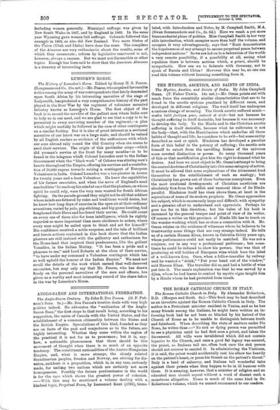LUMSDEN'S HORSE.
The H;story of Lumsden's Horse. Edited by Henry H. S. Pearse. (Longmans and Co. 21s. net.)—Mr. Pewee, who acquired favourable notice among the army of war correspondents that lately descended upon South Africa by his interesting narrative of the siege of Ladysmith, has produced a very comprehensive history of the part played in the Boer War by the regiment of volunteer mounted infantry known as Lumsden's Horse. The first object of the book is to record the services of the gallant men whom India sent to help us in our need, and we are glad to see that a copy is to be presented to every surviving member of the regiment, —a plan which might usefully be followed in the case of other contingents on a similar footing. But it is also of great interest as a sectional narrative of our latest war on a large scale, and should be valued by all English readers as evidence of the enthusiasm with which our sons abroad rally round the Old Country when she seems to need their services. The origin of this partieular corps—which did yeoman's service at the front for many months—is to be found in the telegram whidh Colonel Lumsden sent to the Indian Government when the "black week" of Colette() was stirring men's hearts throughout the Empire, offering his services and a contribu- tion of 50,000 rupees towards raising a contingent of European Volunteers in India. Colonel Lumsden was a tea-planter in Assam for twenty years and a keen Volunteer. He knew the capabilities of his former associates, and when the news of England's need reached him "he made up his mind at once that the planters, on whose spirit he could rely, were the very men wanted for South African fighting. On the parade-ground they might not be all that soldiers whose minds are fettered by rules and traditions would desire, but he knew how long days of exercise in the open air at their ordinary avocations, varied by polo, pig-sticking, and big-game hunting, had toughened their fibres and hardened their nerves. He could count on every one of them also for keen intelligence, which he rightly regarded as more important than mere obedience to orders, where every man might be called upon to think and act for himself." His confidence received a noble response, and the tale of brilliant and heroic actions contained in this book shows that the Indian planters are still instinct with the gallantry and enthusiasm for the Home-land that inspired their predecessors, like the gallant Venables, in the Indian Mutiny. "It has been a pride and a pleasure to me," said Lord Roberts at the close of their service, "to have under my command a Volunteer contingent which has so well upheld the honour of the Indian Empire." We need not recall the details of the work which earned that well-deserved encomium, but may only say that Mr. Pearse, who has drawn freely on the personal narratives of the men and officers, has given us a worthy and most interesting record of the share taken in the war by Lumsden's Horse.


























































 Previous page
Previous page